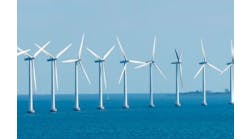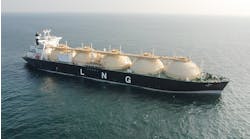Jeremy Beckman, Editor, Europe
This year, IRO - the Dutch oil and gas suppliers’ association - celebrates its 35th birthday. The occasion will be marked by a conference at the Rotterdam cruise terminal in early September.
Among the planned “side-shows” is an offshore problem-solving competition for students from Dutch colleges and technical institutes. Generating interest among young people in the offshore sector is as tough in The Netherlands as anywhere else.
Eighteen new companies joined IRO in 2006, bringing total membership to over 300. Recruitment and training figure high on the list of priorities, particularly among service company members. According to IRO’s managing director Hans De Boer, “Everybody is screening for qualified, technical staff at all levels, from roughnecks and welders to university degree-holder engineers.
“In Holland, IRO has set up a program jointly with the Dutch oil company operators’ association Nogepa, to see if we can attract more people into the industry. One of the problems we’re facing is that the overall training and education of our school pupils has become so limited over the past six to seven years.” The knock-on effect has been growing indifference to careers in engineering, with some technical institutes in Holland closing down due to a lack of students.
“We’re looking at the existing technical schools, and trying to persuade them to set up new training programs for our industry,” he adds. “We’re also looking for related sponsorship from the oil industry; they have to be prepared to pay, if they want help with their skills screening programs.”
Despite the recruitment struggles, Dutch contractors have kept pace with the global surge in offshore and onshore activity. “My personal view is that the present price of crude is ridiculous,” De Boer says, “based on nothing but speculation. In general, business for our suppliers and service companies is booming, with full order books in quite a few cases. And I’m quite optimistic that the situation will continue over the next two to three years or more. The problem for our members - aside from finding people - could be a lack of production capacity.”
As for profits, “that depends which sector you’re in,” De Boer says. “If you look at seismic vessel rates, for example, Fugro is doing well, while drilling rig contractors have more than tripled their day rates. In the general supply and service sector, margins are also improving, but they are nothing compared to those of the oil and gas operators.”
Numerous high profile Dutch and other western European contractors are investing in new pipelay, heavy lift, and transportation vessels. Yards in The Netherlands are benefiting, with the Merwede shipyard, owned by IHC Holland, building two new deepwater pipelay vessels for Subsea 7. Keppel Verolme in Rotterdam is handling the conversion of Allseas’ new pipelay vessel,Audacia.
“Many of these vessels should have been built a few years back,” De Boer points out, “but the contractors lacked the money to do it then. It’s the usual cycle: everyone is scrambling for new construction capacity, in the form of new rigs and installation vessels. In three to four years, however, there will again be a surplus.”
Trading opportunities
At this year’s OTC, IRO’s stand was again the largest of any foreign exhibitor group, with 47 Dutch companies participating. Twenty-one will exhibit at the 450-sq m booth at ONS Stavanger.
Elsewhere, IRO is taking smaller contingents to Rio Oil and Gas and to Neftegaz in Moscow. “Brazil is getting tougher for our members,” De Boer says, “due to more severe requirements for local partners and local production centers. On top of that, market prospects are not as exciting as they were four to five years ago. In Russia, the main interest is gas and LNG - Gasunie is one Dutch company with a particular interest in that sector.”
Another region with growing appeal is the Middle East. Twelve IRO members are exhibiting on the group stand at the Abu Dhabi International Petroleum Exhibition in November. “Adipec is a new try-out for us,” De Boer says, “and so far, it’s looking very promising. There were also nine Dutch companies with their own stands at Iran Oil and Gas in April, in addition to the four on the IRO booth.
“From our members’ point of view, the Middle East is definitely looking up. IRO is planning to set up trade missions to both Kuwait and Qatar, where Shell is a substantial player in LNG and gas-to-liquids. We’re looking at matchmaking programs - setting up meetings with local companies whose skills complement those of our members.”
In the Dutch North Sea, activity appears to be slowing down, with several new development projects about to come onstream. Established players such as NAM, Wintershal, and Gaz de France are committed to further small-scale projects, which benefit a few local fabricators such as Heerema and HSM. But the sector attracts fewer new oil or gas companies than Norway or the UK.
“One interesting thing is that at IRO, we receive a lot of complaints about the general lack of information on oil and gas potential from existing Dutch fields, and available Dutch. The government has responded by launching a new Web site to make this information more accessible -www.nlog.nl. However, the price of crude is also working against would-be investors, as the government sees no need for tax changes. That’s OK for the big boys, but not for the smaller independents.”
The Dutch Ministry of Economic Affairs is making a small amount of money available to deepwater offshore R&D under the new Omnibus project. Fugro, GustoMSC, Heerema, and Huisman-Itrec are the main movers and shakers, says De Boer. European Union funding for the offshore sector has dried up completely, following the dismantling last year of Eurogif, of which IRO was a member. “But we still retain links with our counterpart organizations in Europe, such as EIC, TBL, GEP and Scottish Enterprise. The aim is to exchange information and facilitate business links.”
For more information on IRO, seewww.iro.nl.






